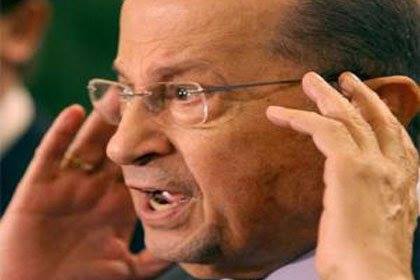Anatomy of a defeat/Why Michel Aoun should only blame himself
Michael Young/Now Lebanon/December 04/15
To establish his bona fides with Hezbollah and Syria, Aoun began casting doubt on the investigation of Rafik Hariri’s assassination. Sleiman Franjieh may not be president yet, or perhaps ever, though that is looking less likely by the hour. However, one man who can already start reflecting on his defeat is Michel Aoun. He once again finds himself shunted aside as the political consensus builds around another Maronite for the presidency.
Aoun can only blame himself for his misfortune. At every juncture the general miscalculated, applauded by a herd of supporters with no sense of the realities of Lebanon’s political landscape. Yet many of the people around Aoun are far from being fools, knowing Lebanon quite well. Why the general failed to benefit from their expertise remains a mystery. Two major mistakes stand out, both of them closely related: Aoun’s reaction to his electoral triumph in the elections of 2005; and his political behavior after 2011, when he helped bring down the government of Prime Minister Saad Hariri. Aoun’s fatal error can be summed up in one sentence: He consciously and repeatedly antagonized the Sunni community, though this was never remotely necessary, undermining the emergence of a consensus around his presidency.
Aoun’s victory in 2005 was a virtual ticket to succeed Emile Lahoud when his mandate ended in 2007. The general was the dominant Christian representative after having poked a finger in the eye of a broad coalition that had sought to contain him.
At that stage Aoun had two paths open before him. He could have chosen to position himself in the middle of the political spectrum, playing March 14 and Hezbollah off against one another, while maintaining good ties with both sides. As the most prominent Maronite Christian, aligned with no one and on good terms with everyone, Aoun simply could not have been circumvented when Lahoud left office. He would have easily earned the support of the Maronite patriarch, and even forced Samir Geagea to go along with him.
Instead, what did Aoun do? In early 2006 he signed a memorandum of understanding with Hezbollah, taking sides amid the growing polarization in the country. The irony is that the party had opposed him in the elections of 2005, so this could not be interpreted as payback against his electoral rivals. More damaging, Aoun made the improbable calculation that he could become president against a majority in parliament.
Not that the memorandum of understanding was in itself wrong. However, Aoun should have signed similar documents with the March 14 political groups, as a means of affirming his middle-of-the-road status. He didn’t do so, and to establish his bona fides with Hezbollah and Syria began casting doubt on the investigation of Rafik Hariri’s assassination. He famously told Marcel Ghanem in March 2006 that since a year of investigations had not reached conclusions about the perpetrators, we had to accept that the Syrian regime may not have been responsible for the killing. Perhaps “fundamentalists” were, Aoun speculated.
One had to wonder what Aoun was thinking. All this did was persuade the March 14 majority at the time that, whatever happened, Aoun had to be opposed at all costs. That’s why in late 2007 Hariri backed the election of Michel Sleiman as president. This took some time to be implemented, but the unanimity around Sleiman carried to the Doha conference in May 2008, and Hezbollah went along with it.
Instead of learning his lesson that Sunni opposition to his presidency would negate any chance of his being elected, Aoun deepened his relationship with Hezbollah. It may have served him well in the cabinet, because the party invariably endorsed his blackmail to ensure his son-in-law would get lucrative portfolios. But it also increased Sunni suspicion of his motives.
And Aoun did not prove them wrong when, in early 2011, he contributed with Hezbollah to bringing down Hariri’s government. So did Walid Jumblatt, but Jumblatt had the good sense to declare himself in the median camp, aligning with Sleiman and Prime Minister Najib Mikati, in that way avoiding a break with the Sunnis. Aoun did no such thing, and made it an active part of his strategy to oppose Mikati at every turn. And when the uprising in Syria began in 2011, he openly supported Bashar Assad’s regime and, later, Hezbollah’s intervention.
Things only got worse when Tammam Salam became prime minister. Aoun was a constant headache, caught between efforts to ensure his own election as president and force the government into taking measures benefiting family members. Most important, Aoun never resolved the contradiction of portraying himself as a legitimate presidential candidate, therefore someone with the national interest at heart, while simultaneously perpetuating a void that was devastating to the country. Aounist rallies became smaller, despite claims to the contrary by the general’s followers, as most Lebanese felt themselves trapped in a dangerous downward spiral.
Aoun naively felt that if things got worse, his chances would get better. Yet such irresponsible brinksmanship only ensured that worried regional and international actors would hurry to find an alternative. They apparently have and because the Saudis had already vetoed Aoun due to his hostility to Lebanon’s Sunnis, he was eliminated from the pot. Perhaps Aoun now regrets the fantastically idiotic demonstration by his partisans last August, when they held up signs equating Hariri and Salam with ISIS.
Some have suggested that Aoun will not survive the setback of seeing Franjieh elected, if that project goes through. No one will lose sleep over that. The general has been a failure for decades, never grasping the fundamentals of Lebanon’s consociational system. A bull in a china shop, he has ignored that even broken china can cause a thousand cuts that end up killing you.
Michael Young is opinion editor of The Daily Star newspaper. He tweets @BeirutCalling.






















